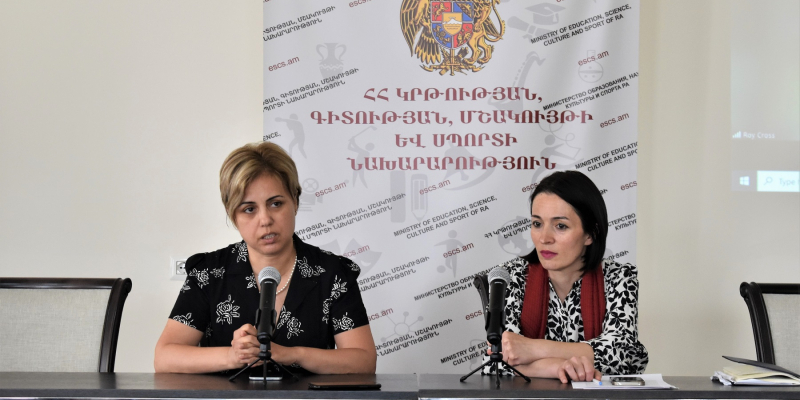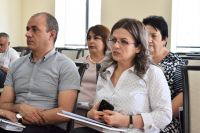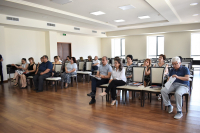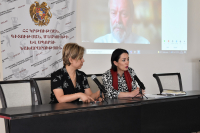The preliminary version of the policy document "System and framework for continuous professional development of teachers (CPD) in public schools of Armenia" was discussed at the RA ESCS Ministry.
The meeting was attended by ESCS Deputy Minister Zhanna Andreasyan, Director of the British Council Armenia Branch Arevik Saribekyan, teachers, representatives of the general education sector.
Deputy Minister Zhanna Andreasyan expressed gratitude to the British Council for the important collaboration in teacher training activities: “Since last year, we have set ourselves the task of reviewing the general policy for teacher training. We have come to the conclusion that superficial solutions will not change the situation, and a new concept and new approaches are needed. They must be efficient, respond to teachers' professional development skills, and foster qualitative changes. The British Council is one of our best partners, who was very quick to respond and managed to achieve a good result in record time.”
The drafting process of the document was participatory: it involved all the structures to which the policy may refer. The stage of implementation of the necessary steps deriving from the document was particularly discussed at the meeting.
The policy document "System and framework for continuous professional development of teachers (CPD) in public schools of Armenia" was developed by the British Council in partnership with Sheffield Hallam University. It offers a system and framework for continuous professional development. The document covers current educational reforms and is based on international best practices. The document establishes certain CPD curricula for novice and experienced teachers, including development cycle, teacher portfolio and points for continuous professional development.
Zhanna Andreasyan made several substantive emphases in terms of teachers' professional development policy. She underlined that this document is not less important than the new standards of general education that will be experimented soon.
“We may have the best educational standard which will remain on paper if there are no teachers to implement it. When we consider our children's learning outcomes at the international review, we see that the highest results are recorded by those children whose teachers have 10-20 years of experience and the lowest results are recorded for teachers with up to 5 years of experience. This means that we have essential problems in regard with the professional development of novice teachers,” noted Zh. Andreasyan.
The needs for training are different; it is impossible to have one single program and expect that all the teachers will receive the necessary assistance and advice. The main objective of the reforms is to be able to jointly develop a policy concept that will foster differentiated training programs and approaches to different groups of teachers. The Deputy Minister expressed hope that they will take a step forward in the implementation of the mentioned approaches within this discussion.
According to British Council Armenia Director Arevik Saribekyan, this system has successfully been applied in different countries of the world. She identified two important components of the new system: thanks to the system, it is possible to offer training opportunities based on the needs of each teacher, and, secondly, teachers themselves will participate in the process of their training will be able to assess their needs and have the necessary opportunities for development.
British Council Consultant on Education Roy Cross remotely welcomed the participants of the meeting and wished them success. He underlined the importance of developing the right policy at the transition stage from the old centralized system to a new, more flexible one.
The participants of the meeting expressed their observations and suggestions on the document, which will be regarded when reviewing it in the near future.
Concluding the meeting, Deputy Minister Zhanna Andreasyan said that an action plan for the coming years will be drawn up, certain deadlines will be determined, and the Ministry will come up with legislative initiatives.






